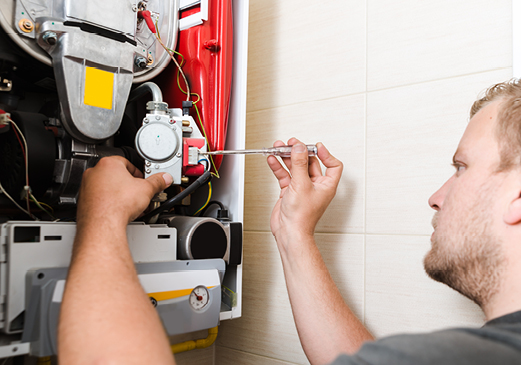Propane vs Electric Heat: Comparing Costs & Benefits
Choosing the right heating method for your home or business can feel overwhelming. Should you go with propane or electricity? Let’s explore the costs and benefits of propane and electric heat to help you decide what’s best for you.
Heating with Propane
Propane is a highly efficient and powerful energy source, offering advantages for both home and business heating systems.
Heating Your Home
Residential propane heating systems provide consistent, high-temperature heat, keeping your home cozy. Propane furnaces are known to distribute heat quickly and evenly throughout living spaces. Unlike electricity, propane is stored in a tank on your property, making it a reliable choice for areas with extreme winters.
Heating Your Business
For businesses, propane heating offers scalability and cost-efficiency, particularly in industries like agriculture, construction, and commercial. It’s ideal for heating large spaces, such as warehouses or greenhouses, thanks to its ability to generate heat quickly and maintain temperatures effectively. Propane’s portability and on-site storage make it an excellent option for businesses in remote areas where electricity may be less reliable.
Heating with Electricity
Electric heating systems are a common choice, but their operation differs significantly from propane systems in terms of performance, efficiency, and reliability.
Baseboard Heaters
Electric baseboard heaters convert electricity into heat through a series of heating elements. While they are relatively inexpensive to install, they take longer to distribute warmth and struggle to maintain consistent temperatures during extreme cold. Ultimately, electric baseboard heaters are best for supplemental heating.
Heat Pumps
Electric heat pumps use electricity to transfer heat from a cool space to a warm space, making cool spaces cooler and warm spaces warmer. Efficiency in this kind of system will be tested as temperatures drop, as they draw in air from the outdoors or heat from the ground. An increase in overall energy costs is expected to meet demand during extreme weather conditions. Many Americans are turning to hybrid heat pump systems to supplement their electric heat pumps.
Is Propane Cheaper Than Electric?
The answer depends on where you live and your home’s energy needs. Factors like weather, electricity rates, and how well your home is insulated can all make a big difference. For an accurate estimate, you’ll want to contact your local utility company or propane provider for their guidance.
What is the Cost of Propane Heating?
On average, Americans spend between $1,000 to $2,500 per year to heat their home with propane. While annual costs are comparable to electricity, there are some caveats to consider:
-
Propane is warmer. Electric heat pumps only dispense air at 95°F, whereas propane consistently supplies air at 120°F. This means higher quality output and shorter warmup times for you and your family.
-
Propane furnaces last longer. Your propane furnace has an average lifespan of 20 years, whereas an electric heat pump typically lasts 12 years. Propane furnaces are also known to have lower repair costs, as their systems are less complicated.
-
Propane is more dependable. Since propane is stored in a private tank on your property, you don’t have to worry about outages the way you would with electricity.
What is the Cost of Electric Heating?
U.S. homeowners’ electric heating costs were estimated to average $1,359 during the winter of 2022 and 2023. However, utility costs vary greatly by location. The best way to receive the most accurate estimate will be to call your local utility company.
Propane vs Electric by Appliance
Beyond heating your home or business, propane and electricity power a wide range of appliances that impact your daily comfort.
Heat Pumps/Furnaces
Propane furnaces provide higher-quality heat than electric heat pumps, especially in colder climates.
Water Heaters
Propane water heaters warm water faster than electric models, so you’re less likely to run out of hot water.
Cooktops & Ovens
Propane stoves heat up quickly and give you more control of cooking temperatures compared to electric cooktops.

Estimate Your Energy Usage
Want to figure out how much energy you use? You can start with some simple calculations.
For propane, use this formula to estimate the BTUs (British Thermal Units) you need:
(desired temperature change) x (cubic feet of space) x 0.133 = BTUs per hour
This gives you a rough estimate, but factors like ceiling height and windows can impact your energy needs. For personalized advice, reach out to Ferrellgas for a quote—we’re happy to help.
To receive the most accurate estimate for the cost of electricity, we recommend calling your local utility company.
Propane vs. Electric Heating Installation Costs
Installing a heating system can be a big expense. Here’s what you can expect:
-
Propane furnaces: $2,200 to $7,400
-
Electric furnaces: $1,900 to $5,600
Maintenance costs for propane heating systems can run a bit higher per visit than electric systems, but they last longer, so you’ll save money over time.
Benefits of Propane Heat
Propane heat offers a range of benefits that make it a compelling choice for homeowners seeking efficiency, performance, and reliability.
Performance & Reliability
Propane heat works quickly and stays consistent, even in freezing temperatures. You’ll feel the warmth right away without long wait times.
Environmental Considerations
Propane burns cleaner than electricity produced from coal or natural gas. In fact, propane produces approximately 52 percent fewer greenhouse gas emissions than the equivalent amount of electricity generated from the U.S. grid.
Versatility
Propane isn’t just for heating—it can power all kinds of appliances, including your stove, water heater, dryer, and grill.
Safety
You’ll find safe propane use is incredibly simple, but we encourage all propane users to be familiar with what to do if you suspect a propane leak.
Dependability
Unlike electricity, propane doesn’t rely on a grid. This gives all-propane-powered homes and businesses an advantage during power outages.

Should I Switch from Electric to Propane?
If you’re looking for a reliable, cost-effective, and environmentally friendly heating option, propane could be the answer. Contact Ferrellgas today to learn more about how propane can power your home or business.
Additional sources:
Baseboard Heating 101, Bob Vila
Electric Furnace vs. Gas: Which Heating System Is Right for Your Home?, Bob Vila
How do heat pumps work?, NationalGrid
How much does a propane furnace cost to install?, HomeGuide
How much does an electric furnace cost?, HomeGuide
CATEGORIES
Archives
- Summer 2025
- Spring 2025
- Winter 2024
- Fall 2024
- Summer 2024
- Spring 2024
- Winter 2023
- Fall 2023
- Summer 2023
- Spring 2023
- Winter 2022
- Fall 2022
- Summer 2022
- Spring 2022
- Winter 2021
- Fall 2021
- Summer 2021
- Spring 2021
- Winter 2020
- Fall 2020
- Summer 2020
- Spring 2020
- Winter 2019
- Fall 2019
- Summer 2019
- Spring 2019
- Winter 2018
- Fall 2018
- Summer 2018
- Spring 2018
- Winter 2017
